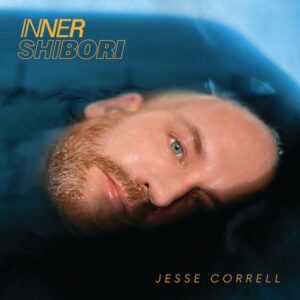Recommended Tracks: “Begin Again, Again”, “Life”, “Hope Like Adrenaline”
Artists You May Like: JP Cooper, Allen Stone, James Bay
For singer-songwriter Jesse Correll, there is a lot more to the Japanese shibori technique than meets the eye. A dyeing process that involves stitching, compressing, and binding cloth, shibori is all about the beautiful result that comes from such an intense procedure. When Jesse learned about this technique, he found that it served as a metaphor for the patterns we make in life – after all of the experiences we go through, good or bad, there is something special that waits for us in the end. On his new album, Inner Shibori, Jesse takes what he has learned from shibori and applies it to the work he had to do on an individual level to get to a place where he could feel content.
The work that Jesse has done is frequently realized across the songs we hear on Inner Shibori. We have tracks that follow in the style of the album’s opening track “Go Deeper,” where Jesse admits that he needs to embrace his issues and look into his past in order to move forward. Over a warm production, Jesse sings, “I’m so tired of doing what I’ve done,” and decides to “go deeper” in order to make significant change. There is also the down-tempo “Dusty Sweetness,” where Jesse asks, “Where is that good little boy I used to be?” The vulnerability that Jesse shows is moving, especially on the piano ballad “Life,” where he sings, “You made me real and I woke up / You helped me feel / And I gave you love,” accepting that heartbreak is just a part of life.
As Jesse presents these experiences, he also includes the steps he will take to find closure. Much of this involves the notion of trying and wanting to get better, as Jesse so states on the cinematic “I’ll Just Keep Tryin’” and “Hope Like Adrenaline.” The former focuses on Jesse’s abilities as a partner, where he knows that his “love his imperfect,” but chooses to stay around and work through his flaws. The latter is about using the possibility of another day to get through the hard times. Accompanied by celebratory horns and driving drums, Jesse sings, “I’ll use hope like adrenaline to get me through these nights.” His perseverance is inspiring, which makes these tracks such phenomenal standouts on the album.
Even though there are many serious moments on Inner Shibori, there are also tender moments where Jesse revels in the good times. On the innocent “Backyard Thursday,” Jesse recounts, “I can feel the good vibrations to this day / In my backyard Thursday,” surrounding himself with that memory. We also have the intimate “Begin Again, Again,” where Jesse describes how it felt to reunite with his lover after spending time apart. While the lyrics are not jovial, in that they deal with the turmoil that came about during that time, the lively music implies that all of this was for the better.
Of course, as Inner Shibori is a reflective album that covers a lot of the human experience, it does well to keep things light. Most of this is due to the musical nature of these tracks, which contain the catchy elements of jazz, R&B, and pop. Additionally, Jesse’s comforting voice makes a lasting impact, as his rich timbre comes across as hopeful and guiding. The sense of ease that emerges at the end of the album signifies that Jesse has conveyed the inner shibori he set out to achieve.
You can listen to Inner Shibori on platforms like Spotify and Apple Music.
Keep up with Jesse Correll: Instagram // Facebook // YouTube // Website



